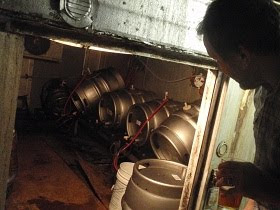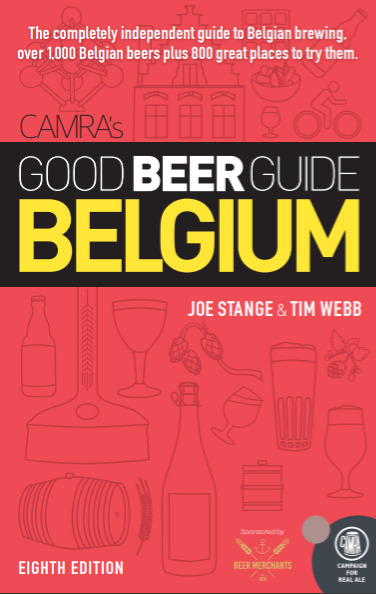If you've been reading my blog for a while, this won't surprise you: One of the things I miss most about living in Belgium is living nearer to British cask ale. I already loved Belgian beer when I moved to Brussels more than four years ago. I expected to keep loving it. What I did not expect, while there, was to fall in love with British cask ale. Also unexpected was finding a thriving cask ale scene on my visits back to the States.
I already loved Belgian beer when I moved to Brussels more than four years ago. I expected to keep loving it. What I did not expect, while there, was to fall in love with British cask ale. Also unexpected was finding a thriving cask ale scene on my visits back to the States.
And so I've got to raise a point and a question about the latest Cask Report, written by colleague Pete Brown and funded by the industry. The gist of the report is that more British people are drinking cask ale, and more British pubs are selling it, even if volume there is not increasing overall. (All this is happening while pubs are closing and other beer sales are dropping pretty dramatically, so one way to put it might be, "Wow, guys, things sure could be a lot worse!" Which is totally fair to celebrate, frankly.)
On his blog last week Pete wrote, "But despite the fact that many people simplify this good news into 'cask is growing,' actually it's not. Cask's fantastic performance is great news for drinkers, but good as it is, it's still only static in volume terms."
Here is my point: The Cask Report only covers the U.K., which is what it is supposed to do. It does not cover the U.S. (although Garrett Oliver notes in the foreword that "hundreds of American craft breweries make cask beer these days.") Meanwhile I've seen--with my own beady eyes, I mean--plenty of anecdotal evidence that cask ale is thriving among us Yanks. Everywhere I went on my recent trip--Mid-Atlantic region, Midwest, Mountain states, and the Pacific Northwest--I found cask ale options that had not always been there. And I saw people drinking it. Here is my question: Does anyone have numbers to prove or disprove my point? My suspicion is that cask ale volume is actually increasing in the United States... and it might even be increasing somewhat dramatically. That would mean logically that cask ale volume overall is increasing as well, although it would sadly not include the British brewers and enthusiasts who sponsor the Cask Report.
Here is my question: Does anyone have numbers to prove or disprove my point? My suspicion is that cask ale volume is actually increasing in the United States... and it might even be increasing somewhat dramatically. That would mean logically that cask ale volume overall is increasing as well, although it would sadly not include the British brewers and enthusiasts who sponsor the Cask Report.
But for for those of us who carry a love of cask ale with us wherever we travel, wherever we live, it would be welcome news just the same. Because, to quote Mr. Oliver's foreword again, "British cask beer is an inspirational thread that runs through a worldwide artisanal brewing movement."
So... Does anyone track cask ale production or consumption in the United States? Or farther abroad?
Upper photo: Cask porter and fries at the Mad Fox Brewing Company in Falls Church, Virginia. Lower photo: Oliver head brewer Steve Jones peeks into the cask cellar--into which only he is allowed--beneath the Pratt Street Ale House in Baltimore.
Monday, October 4, 2010
Actually, Cask Ale IS Growing... Isn't It?
Subscribe to:
Post Comments (Atom)






I wish there were more cask to be honest, even though here in Charlottesville we have a couple of places with handpulls. My question though is whether or not the beer in the cask is genuinely "cask conditioned" rather than just left unfiltered - certainly a fair few of the cask pints I have had have been far too warm. On the up side though, it is great to ask for a beer unsparkled and the barman knows what you mean!
ReplyDeleteNo doubt, that's the elephant in the barroom with American "cask ale." How much of it is just craft beer served from a cask, rather than cask-conditioned "real ale" according to the CAMRA definition? Certainly very little of it is brewed with cask conditioning in mind.
ReplyDeleteThen the next question would be, how important is the difference, really, if it still tastes good?
That is certainly a question, but I know of breweries where they don't prime their casks at all, just fill straight from the primary. Then of course there are questions of stillage and cellarmanship. Given the money I would love to start a pub which had only properly conditioned, cellared and served cask beer - but I am not convinced that the market exists here to make it a long term, viable business model. I fear that cask conditioning will be next year's dry hopping, just as dry hopping seems to have replaced last year's bourbon barrel aging. A tad cynical perhaps I know.
ReplyDelete"That is certainly a question, but I know of breweries where they don't prime their casks at all, just fill straight from the primary."
ReplyDeleteI think this is increasingly common. Although the discussion here is about bottling, I think it's increasingly common with cask beer too.
I have been happily drinking cask ale in my hometown Oulu, Finland, for several years, and according to the CAMRA standards. During my travels also in elsewhere Finland, Sweden, Denmark, Italy, France, New Zealand. While it is definitely just a marginal thing in these countries, cask ale is not only a UK or US practice.
ReplyDeleteCask is on the rise in Ireland again too. After a complete death it has in recent years gone from none to enough places in the country that I probably cant count using the fingers on both hands.
ReplyDeleteMore please.
The Pretty Things KK I had on Sunday in Deep Ellum in Boston had been primed and was in lovely condition. The owner was happy to pull mine through a sparkler, too.
ReplyDeleteRon, the price for mentioning the KK in a comment here is that you now have to send me two bottles. Or have Pretty Things send them.
ReplyDeleteI have no hard numbers to share, just more anecdotal evidence that real ale, properly brewed and served, is growing in the US market. The Great Taste of the Midwest festival in Madison, WI (2nd longest running beer fest in the States behind the GABF and simply-put, a brilliant event that is astonishingly well-run by the good people at the Madison Homebrewers and Tasters Guild, for the uninitiated) has, for the past five years, had a dedicated real ale tent; cask conditioned beers, unfiltered, albeit not necessarily at cellar temperature, being that the event is held in August. This year's festival boasted nearly sixty beers, produced by a veritable who's who of Midwestern breweries. To say the least, these beers don't all correspond to traditional English real ale beer styles, but we're talking about American craft brewers, after all.
ReplyDeletehi, when you say "I already loved Belgian beer when I moved to Brussels more than four years ago. I expected to keep loving it. What I did not expect, while there, was to fall in love with British cask ale." do you mean you can find cask ales in Brussel?
ReplyDeleteI'im living here since few weeks and i'd love to have a fresh hoppy pint straight from the cask!
cheers,
Etienne
Sorry Etienne. What I meant was that London was an easy trip away via Eurostar, and well worth the trip.
ReplyDeleteHowever you can get Brussels' version of cask ale--hand-pulled lambic--at Moeder Lambic and a few other places. Many will envy you for that.
You can also find some nice British beers in bottles at Stone Manor, just outside of town near Tervuren. There's also a location in Waterloo but I can't vouch for that one. It may have the same selection.